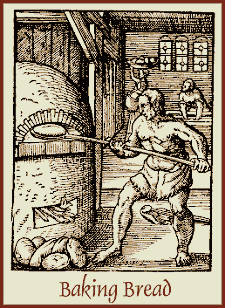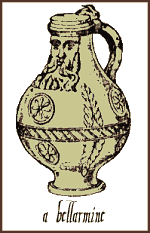
Of Bread and Wine
The situation of our region, lying near unto the north, doth cause the heat of our stomachs to be of somewhat greater force:
therefore our bodies do crave a little more ample nourishment than the inhabitants of the hotter regions are accustomed withal,
whose digestive force is not altogether so vehement, because their internal heat is not so strong as ours, which is kept in by
the coldness of the air that from time to time (especially in winter) doth environ our bodies.
— Wm. Harrison, Description of England, 1577
Breads
These qualities of bread were commonly baked at Ingatestone Hall in the 1550s.
| Manchet | (man'-chett) A very fine white bread made from wheat flour. Harrison says that one bushel of flour produces 40 cast of manchet, of which every loaf weighs 8 ounces going into the oven and 6 coming out. |
| Cheat | A wheaten bread with the coarsest part of the bran removed. |
| Ravelled bread | A kind of cheat but with more bran left in. Harrison also says that the ravelled cheat is generally so made that out of one bushel of meal, (after two and twenty pounds of bran be sifted and taken from it), they make thirty cast, every loaf weighing eighteen ounces into the oven, and sixteen ounces out. This makes a "brown household bread agreeable enough for laborers." |
The gentle folk commonly eat wheat bread. Their poorer neighbors often use only rye or barley. In very hard times, beans, peas and (shudder) oats may be used.
Drink
| Perry | A (very) slightly alcoholic pear cider |
| Verjuice | A very sharp vinegar made from grapes; used for cooking or as a condiment. |
| Wines | include malmsey, canary, rhenish, claret, sack, and sherry |
| Sack | Sherry, some times called "Jerez wine" |
| Aqua vitae | Any strong spirit such as brandy |
| Brandywine | A distilled wine |

Most wines are sweet and rather heavy. They probably have to be strained before you want to drink them, and may still have solid matter floating in them.
Sugar and spices ("cinnamon and ginger, nutmeg and clove") are often added to wine and even to beer.
Rhenish is a German wine, and very strong.
Claret comes from Gascony (southern France).
Canary is a white wine from the Canary Islands.
Sack comes from Spain. Sack is popularly sweetened with sugar.
Beer in England is usually ale, made without hops, and is relatively flat. It can be flavored with just about anything, including pepper, ivy, rosemary, and lupins.
Measuring it out
A tun is equal to:
- 2 butts (as in malmsey) or
- 4 hogsheads (as in wine) or
- 252 gallons
- 4 hogsheads (as in wine) or
A puncheon equals 84 gallons.
A runlet is various smaller amounts.
![]() What We Eat
What We Eat
![]() Food & Your Lifestyle
Food & Your Lifestyle
![]() More of What We Eat
More of What We Eat
![]() Snack Foods
Snack Foods
![]() A Jack and a Gill
A Jack and a Gill
![]() Good English Ale
Good English Ale
Sources
Emmison: Tudor Secretary
William Rubel, Correspondence.
See http://www.williamrubel.com/artisanbread
and
http://www.williamrubel.com/forum
Tusser, Thomas, Five Hundred Points of Husbandry as explored in Hartley, Lost Country Life
Harrison: A Description of England, 1577/1587





25 March 2008 mps
